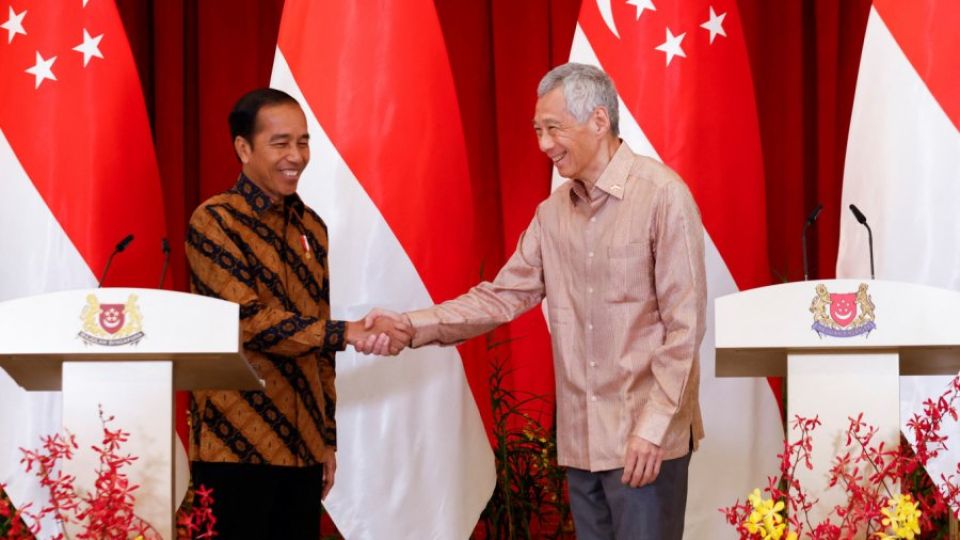March 21, 2023
JAKARTA – The meeting with Singapore’s Prime Minister Lee Hsien Loong in the city state last Thursday was the latest stride in President Joko “Jokowi” Widodo’s global campaign to raise enough funding for his Nusantara capital city megaproject.
Honestly, I am doubtful about Jokowi’s ambition, but knowing his proven track record in infrastructure development, he may eventually be able to relocate the capital city from Jakarta, although at a slower pace than expected.
At home, one of his efforts to realize his Nusantara dream is by ensuring whoever will succeed him in October next year will continue the project. Of the three leading presidential candidates so far, Defense Minister Prabowo Subianto and Central Java Governor Ganjar Pranowo can fulfill Jokowi’s hopes. The other potential nominee, former Jakarta governor Anies Baswedan, is unlikely to do so as he has built an image as the antithesis of Jokowi.
Nusantara, meaning “archipelago”, will cover North Penajam Paser regency and Kutai Kertanegara regency in East Kalimantan. Jokowi plans to celebrate Independence Day on Aug. 17, 2024, in the new capital. State institutions and governments, as well as their employees, will be relocated gradually, starting in 2024 with the defense, home and foreign ministries and the State Secretariat.
Until COVID-19 struck early in 2020, I fully believed Jokowi would be able to fulfill his quest to relocate the capital city before the end of his second and final five-year term in October 2024. His passion for infrastructure development was evident in massive development projects during his first term, including the 1,250 kilometers of new toll roads across Java and Sumatra.
When Jokowi revealed his capital city-relocation bid during the 2019 presidential election campaign, many people shared my confidence he could just do it. Many prominent scholars and foreign observers did not believe Jokowi could realize his dream, but they accepted Jokowi’s rationale for the relocation.
When the President officially proposed to relocate the capital to Kalimantan in his state of the union speech on Aug. 16, 2019, I believed he could deliver it. He also promised to table a draft law on the capital city development to the House of Representatives. The bill was passed into law last year.
Article 3 of Law No. 3/222 on the state capital says the Nusantara capital city (IKN) will be managed by the IKN Authority, a ministerial-level institution. The IKN Authority head is appointed and dismissed by the President after consultation with the House of Representatives.
But as soon as the COVID-19 pandemic reared its ugly head in mid-2020, I began to doubt the President’s capability to fulfill his promise. And when the health crisis worsened in early 2021, I concluded that the President should forget his ambition, or at least he should be ready to accept the reality that it would be his predecessors who would complete his pet project, perhaps at a slower speed.
At the end of 2021, as COVID-19 hit the country hard, I bet with some foreign friends that Jokowi would kill his ambition. I assumed that if he insisted the show must go on, the project would only stall or become mired in scandal.
The President has launched several diplomatic missions to lure investment for the Rp 466 trillion (US$32.6 billion) project. As reported by The Jakarta Post, following the withdrawal of SoftBank Group last year, the government has been scrambling to refinance the Japanese conglomerate’s $30 billion investment, appealing to countries like China, Finland, Germany, the Netherlands, Singapore, the United Arab Emirates (UAE) and the United Kingdom to help fund the project.
According to the plan, the state budget will cover up to 20 percent of the total spending on the project, while the lion’s share of 80 percent will come from the private sector, including foreign investors, under public-private partnership (PPP) and private investment mechanisms.
But with the elections on the horizon, many investors, at home and overseas, will naturally opt to wait until Indonesia chooses a new leader who is committed to realizing the capital-relocation dream.
Wooing Singapore to invest in the megaproject is therefore a daunting job for Jokowi. Dealing with Singapore is always based on crystal-clear, prudent economic and business principles. You may dislike it, but the city state has proven that the fundamentals work effectively. Prime Minister Lee Hsien Loong will decide whether to invest in the new capital project on the basis of rational and visible principles.
In their joint press conference after their bilateral meeting, Lee mentioned Nusantara in three paragraphs of his official remarks, all of which were cautiously written. Lee supported the President in general but refrained from making major commitments until everything is clear, including that the project will continue as scheduled even after Jokowi is no longer in power. And that is the problem with Jokowi’s ambitious project.
“President Jokowi and I discussed the Nusantara project at length and his vision for a ‘green’ and ‘smart’ Nusantara. It is a major priority for the President and Indonesia. Singapore is happy to support the President’s vision. We will contribute toward knowledge-sharing, and joint R&D activities,” PM Lee said.
Many people, myself included, have little trust in President Jokowi’s ability to deliver his promise to relocate the capital city. I do not mean to compare dictator Soeharto with Jokowi because it is not relevant at all but democracy prevents the latter from emulating Soeharto’s way of forcing his will on the nation.
As a politician Jokowi has several times proven his critics wrong. He still stands a chance, no matter how small, of moving the capital city to Nusantara, capitalizing on the political clout at his disposal. After all, politics is, as Otto von Bismarck put it, the art of the possible.
***
The writer is senior editor at The Jakarta Post.


